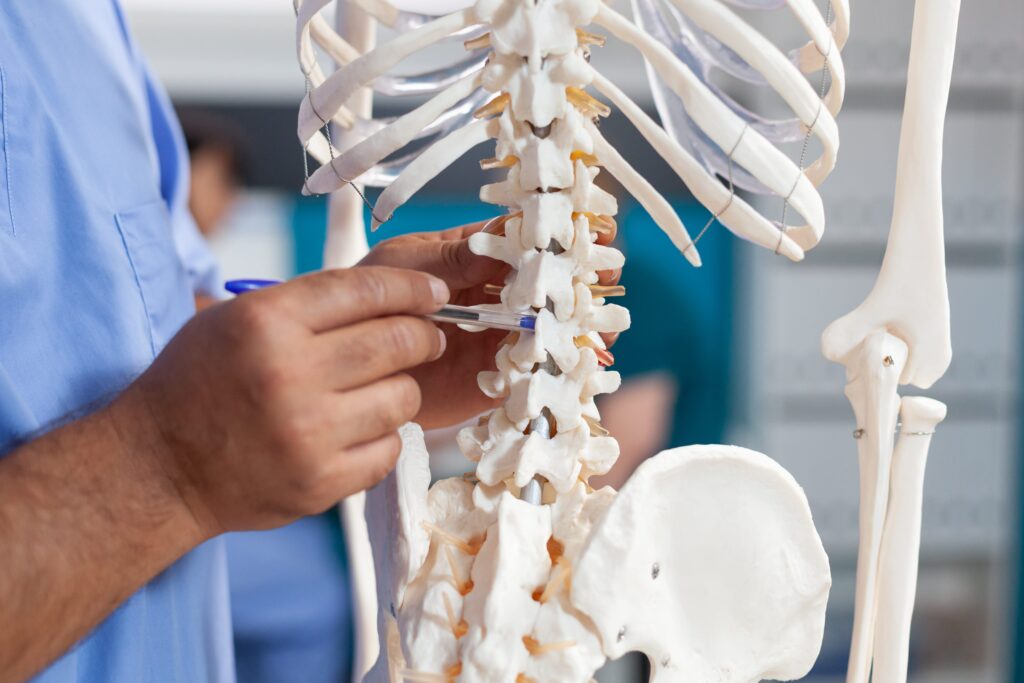Can Weight Loss Cause Back Pain?
Can Weight loss cause back pain? This may sound surprising, as most people would think that lowering their weight should decrease the load on their spines and make them healthier. However, as many people discover, weight loss can bring an array of challenges, including back pain. This article will explore why weight loss can cause back pain, delving into the causes, preventive measures, and how to manage this issue effectively.
The Connection Between Weight Loss and Back Pain
How Weight Loss Affects the Body
Losing weight is not merely eliminating fat from your body. It is a complicated process requiring your body to undergo many changes. Your muscle masses, fat distribution, ways of maintaining your balance, and the work of virtually all body systems lose weight.
Weight loss may particularly affect bone density and muscle mass. Specific muscles may become weaker, especially at the beginning of the process. The trunk muscles, which help you maintain your balance and spine position, can become weaker and less valuable to your body.
Possible Side Effects
It can be answered affirmatively that weight loss can cause back pain, given the circumstances in which it sometimes occurs. Specifically, a rapid decrease in weight and overall body mass will likely lead to a change in the structure and mechanics of the human body. Weight loss in the region surrounding the abdomen causes poor posture and alignment of the body, subsequently leading to back pain in some individuals.
Common Causes of Back Pain During Weight Loss
Loss of Muscle Support
The most evident reason people might experience back pain while losing weight is the loss of muscle mass. Muscle tissues are responsible for keeping the spine in the desired posture, and when these muscles are weak, the spine is likely to develop an injury. This risk occurs mainly in fast weight loss without enough nutrients for balanced muscle strengthening. Such a mechanism can be observed when individuals do not include physical exercise and weight lifting as part of their overall weight loss regimen.
Changes in Posture and Alignment
With decreased belly fat and overall body mass, individuals will likely have difficulty adjusting their new centre of gravity, which can stress the lumbar zone. As a result, individuals with imbalances might experience severe back pain and muscle relaxation.
Nutritional Deficiencies and Their Impact
Weight loss is beneficial for most individuals since it improves their general health. The main difficulty is that most people who start this process consume fewer foods and ignore whether the food is balanced. Specifically, most people on a diet are deficient in calcium and vitamin D, the essential mineral salts in the body. Such unbalanced chemicals make their bones weak, and their muscles get worn out. Such a situation makes them more susceptible to injury, especially injuries that might result in back pain. It is essential to consider that while losing weight is beneficial, it should be managed to keep a person’s spine safe.
Diagnosis of Back Pain After Losing Weight

Identifying the Source of Pain
When it comes to back pain during or after losing weight, the first step is to diagnose the source of the pain. This can be done in various ways, including physical exams, imaging tests like X-rays or MRIs, and a medical history review.
To treat the pain appropriately, it is critical to understand whether it is caused by muscle strain, joint issues, or nerves. Many weight loss efforts result in muscle pain, whereas back joint problems may be a form of arthritis.
Differentiating Between Muscle, Joint, and Nerve Pain
Muscle pain may result from strain or injury, while joint pain may result from arthritis. Understanding the type of pain is necessary to determine an appropriate treatment plan. Nerve pain, such as pain caused by a herniated disc, necessitates an entirely different treatment.
When to See a Specialist

It would be necessary to see a specialist, especially when the back pain does not stop causing discomfort or even becomes worse over time because of weight loss. Orthopaedic doctors, chiropractors, and physical specialists are those who can diagnose and address back pain effectively.
Intervention in the problem at its early stages would be important to prevent the issue from becoming chronic and enable people who have lost weight to return to normal functioning much sooner.
Lifestyle Changes to Cure Back Pain
Incorporating Regular Exercise
Exercise is important for weight loss and back pain. Strength training and regular aerobics help people retain muscle mass and normalize their spines. A strong core provides more support for the back, and the intensity of back pain is expected to decrease.
Flexibility and mobility are also important for spinal health, which may benefit from yoga or similar practices. A good exercise plan addresses all the physical demands placed on the spine and contributes to the full range of movement.
Ergonomic Adjustments
Ergonomics is crucial to daily living, as family people spend many hours in the office working at a desk. Therefore, understanding how to sit, stand, lift, push, and pull safely is crucial. Sometimes, adjusting the chair’s height is essential to protect a vulnerable lower back.
Ergonomics is vital for those who have lost weight and do not possess the soft underlayer of extra fat and muscle to cushion and account for new posture. Ergonomic practices will help these individuals avoid back pain.
Stress Management Strategies
Stress also triggers back pain, especially during weight gain or loss. Muscle tension in the back and neck occurs when people live a stressful lifestyle, which is not recommended.
Healthy Sleep Habits
Sleep is necessary for health, including spinal health. Adequate support from a well-fitted mattress protects against back pain.
Ensure that your mattress offers proper support and that you maintain the correct position while sleeping to keep the natural curve of your spine.
It is especially crucial for those who are overweight or have lost some weight not to let sleep worsen their back condition.
Addressing and Preventing Back Pain While Losing Weight
Gradual and Sustainable Weight Loss
Weight loss should be gradual and sustainable to avoid back pain. Rapid weight loss involves losing muscle mass and other issues that can lead to back pain. As the body needs to get used to weight changes, a slow rate is more comfortable.
Strengthening Exercises
Exercises primarily focusing on the back and core muscles can be critical in avoiding muscle mass loss. Besides, better spine support will be achieved in the process. Planks, bridges, and leg raises primarily affect the core, while back extensions and rowing exercises influence the back.
Based on this, it can be concluded that exercise is crucial to determining whether weight loss could lead to back pain. Proper Nutrition
Proper Nutrition

To avoid back pain, a well-balanced diet should be maintained to lose weight and keep good health. Calcium, Vitamin D, and other elements are essential for the bones and muscles, and their lack can exacerbate back pain. As such, you must ensure that what you eat contains these elements.
The Role of Professional Guidance
When to speak with a doctor
It is crucial to seek the advice of a doctor if you notice persistent or increasing back pain throughout your weight-loss journey. Some signs that you need professional intervention include feelings of severe pain, pain that stretches to your legs, or pain accompanied by numbness or tingling. Early diagnosis helps initiate treatment and avoid further complications. In addition, the medical attendance will ensure you adhere to your weight-loss schedule.
Who to Work With
Healthcare professionals can help develop a workout plan that ensures weight loss safely and effectively. They make this schedule considering the resulting back pain, so no particular step is missed. The professionals could include a vascular doctor or a physical therapist in other fields. They will recommend many exercises and treatments that specifically tackle the causes of back pain.
Practical Tips for Managing Back Pain During Weight Loss
Incorporate Flexibility and Mobility Exercises
Flexibility and mobility exercises, such as yoga and stretching routines, can help maintain your range of motion while you reduce back pain for good! These exercises get the spine swivelling in a full circle and release tension from the back muscles. Regular practice of such exercises can help keep you integral and provide a better future for your spine. It also fortifies your whole system to enjoy excellent health for a long time.
Mindful Movement and Ergonomic Practice
Paying attention to how you move and practising proper ergonomics effectively avoids back pain. Little bits of attention, such as picking up objects by bending at the knees or making sure your workspace is ergonomically designed, can greatly influence your spinal health. Proper body mechanics in daily activities are necessary for preventing back problems transferred through a growing body mass and pain during weight loss.
Listening to Your Body During Weight Loss
It is essential to listen to your body as you lose weight. If you feel discomfort or pain, altering your weight loss plan or consulting a professional may be necessary. Ignoring pain through medication or negligence will ultimately compound troubles, so always pay attention to what your body is telling you.
Conclusion
Can weight loss cause back pain? Yes, mainly if it is done carelessly. Although weight reduction has many health benefits, including decreased pressure on the back, caution should always be taken to avoid undesired side effects like back pain.
Knowing how back pain develops during weight loss means that strategies can be devised to prevent and manage it. With that knowledge, you’ll be able to achieve your weight-abstention goals while maintaining a healthy spine. Many people mistakenly believe that the solution to both their overweight problem and their back troubles can be achieved by taking the same balanced approach.
Frequently Asked Questions (FAQ)
Yes. Fat stomachs have been linked to back pain because they cause changes in posture and increased strain on the lower back. For overweight people, abdomen fat can shift the body’s centre of gravity to the back, causing discomfort and eventually leading to back pain.
A stomach full of fat can cause back pain by shifting your centre of gravity so that your lower back muscles are overexerted, which is also very bad for your posture. If left unchecked without proper exercise drills and corrective movements, the new weight forward on one’s centre of gravity can lead to poor and increased risk for all kinds of back trouble.
Yes, Back pain is common when losing weight, especially if the weight loss is rapid or involves significant muscle loss. Changes in posture and nutritional deficiencies during weight loss can also lead to back pain.
Your body may ache after losing weight because of muscle loss, a change in posture, or nutritional deficiency. Rapid weight loss also means that your body has to get used to a new centre of gravity, especially in the back, leading to discomfort.
A fat stomach can cause back pain when it drags the pelvis forward and creates an extra curve in the lower spine. The extra weight in front of the body pulls everything out of line, resulting in discomfort, especially if one’s core isn’t appropriately trained.
Weight gain can cause back pain, mainly if most of the added poundage is concentrated in your abdomen. Extra weight on your spine increases the load–leading to discomfort and, in some cases, back problems over time.




